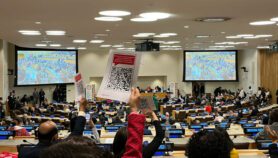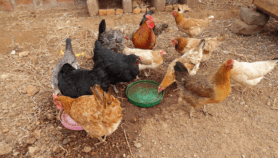By: Mun-Keat Looi
Send to a friend
The details you provide on this page will not be used to send unsolicited email, and will not be sold to a 3rd party. See privacy policy.
Seventy senior scientists and health officials worldwide have called for data on the spread of bird flu and the genetics of the H5N1 virus to be shared internationally.
Their plea, in a letter published online by Nature today (24 August), follows a series of high-profile criticisms that scientific secrecy is thwarting efforts to control the spread of the virus.
The letter’s authors propose the creation of a Global Initiative on Sharing Avian Influenza Data (GISAID) that would promote the sharing of data via public databases within six months of it being analysed and validated.
GISAID would also encourage collaboration between researchers in industrialised and those in developing countries, and highlight the need for funding and technical assistance to build comprehensive disease-surveillance programmes.
Currently, governments and researchers linked to animal and public health agencies restrict access to much of the information they hold on bird flu outbreaks.
Some scientists also hoard data so that they can be the first to publish it in academic journals.
Today’s letter says that defeating the virus will require scientists with different areas of expertise to have full access to genetic, clinical and other data from both animal and human outbreaks of the disease.
Several steps have already been taken to improve collaboration.
In May, the seven member states of the South Asian Association for Regional Cooperation agreed to share information on bird flu (see South Asian nations plan joint bird flu strategy).
The previous month, six nations in East and South-East Asia launched a research partnership and pledged to share data (see Asian nations team up for bird flu research).
But these efforts are not enough, says the letter, “given the magnitude of the threat”.
The appeal echoes recent editorials in Nature (See Bird flu data must be made public – and fast) and The Lancet (see Bird Flu threat needs open, coordinated response) that have urged an end to the secrecy.
The letter’s authors include Ilaria Capua, chair of the scientific committee of OFFLU — the bird flu network set up by the UN Food and Agriculture Organization and the World Organisation for Animal Health (OIE) — and Nancy Cox, director of the influenza division at the US Centers for Disease Control and Prevention (CDC).
The CDC is leading by example. On Tuesday (22 August) it placed the genetic data from more than 650 strains of flu virus into a public database.Link to full letter in Nature
Link to related article in Science













